Essay On Dentist (Structure/Outline)
- Introduction
- History of Dentists
- Responsibilities of Dentists
- The job of a Dentist
- Modern Dentistry
- Different Specialties in Dentistry
- FAQS
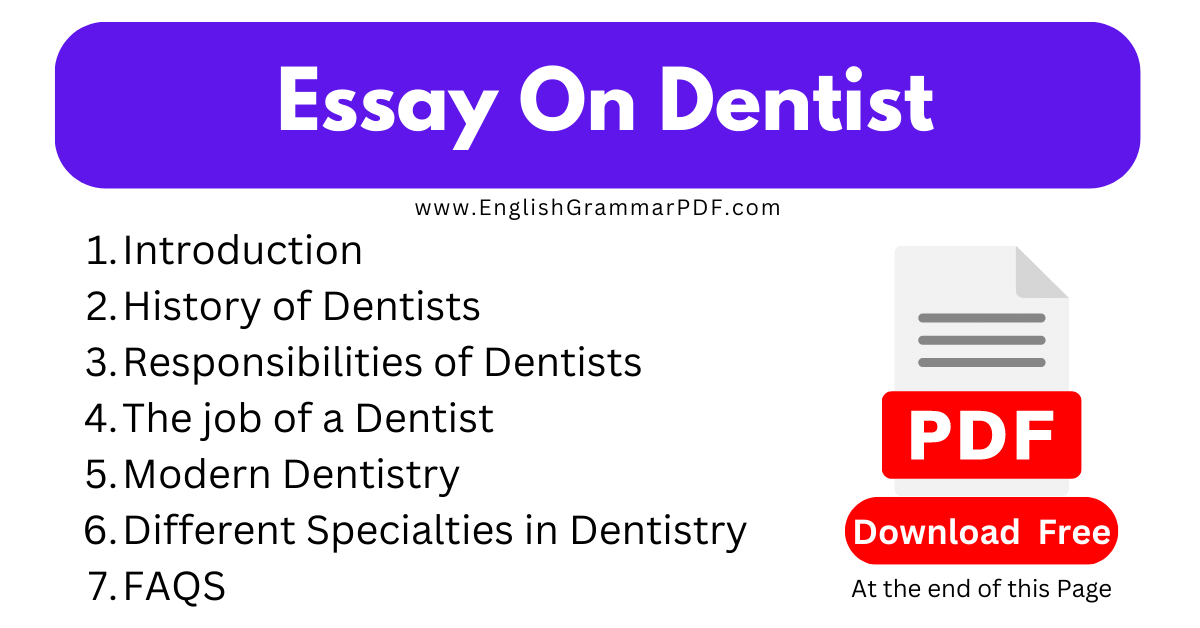
Introduction
Dentistry is the branch of medicine that deals with the diagnosis, prevention, and treatment of diseases and disorders related to oral health. Dentists, also known as dental surgeons or oral health care practitioners, specialize in treating a variety of oral problems.
This can include diseases of the teeth and gums, along with other issues such as root canal work, dental implants, and orthodontic treatments. Dentists can diagnose and treat diseases of the teeth, gums, and mouth, as well as provide preventive care to help maintain healthy oral hygiene.
History of Dentists
The history of dentistry dates back thousands of years. Evidence suggests that primitive people from ancient civilizations such as the Chinese, Egyptians, and Greeks practiced rudimentary forms of dentistry. In ancient
In Egypt, for example, hieroglyphs depict tooth extractions using forceps. Although these practices were primitive compared to modern dentistry, they demonstrate a recognition of dental problems and an attempt at their treatment.
The practice of modern dentistry began in the late 1700s. During this time, dentists began using tools and techniques still used today. These include dental drills and other tools for cleaning teeth, filling cavities, extracting teeth, and performing root canals.
Responsibilities of Dentists
Dentists are responsible for diagnosing, treating, and preventing oral health issues. This can include conditions such as cavities, gingivitis, tooth decay, and periodontal (gum) disease. Dentists also perform extractions, fillings, root canals, and crowns when necessary.
In addition to these standard services, dentists can also provide cosmetic procedures such as veneers, teeth whitening, and braces. Dentists may also fit patients with braces and corrective appliances to realign their teeth or alleviate the chronic pain that can be caused by misaligned jaws.
Dentists are also responsible for educating their patients on proper oral hygiene techniques, such as brushing and flossing, to help prevent future dental problems. By providing these services to individuals of all ages both privately and publicly sponsored programs, dentists are dedicated to promoting dental health for the betterment of society.
The job of a Dentist
A dentist’s job is to diagnose and treat conditions affecting the mouth and teeth. Dentists utilize a wide variety of tools to perform their duties with precision and accuracy. From small hand instruments that are used to delicately probe teeth, to mirrors and explorer tips that enable them to detect abnormalities, dentists have access to the latest technology to provide high-quality care for their patients.
These advanced tools have made much of the work conducted in a dentist’s office quick and efficient, allowing for a more meticulous examination of each tooth and more extensive cleanup procedures.
In addition, there are now specialized cameras and imaging systems which allow the dentist to take detailed images of the mouth so they can better plan treatments and assess results. With these modern dental tools, dentists can give their patients nothing but the best care possible.
They also may provide preventative care such as sealants or fluoride treatments to protect against decay and cavities. Dentists also use special instruments to perform cosmetic procedures such as whitening teeth and replacing missing teeth with dental implants.
Modern Dentistry
Modern dentistry has evolved significantly over the years. Technology has made it easier for dentists to diagnose and treat many conditions with greater accuracy, comfort, and speed.
Laser dentistry
Dental lasers provide a safe and effective way for dentists to perform a wide range of procedures. From removing decay to whitening teeth, lasers can make treatment easier and more comfortable for patients.
Laser dentistry has revolutionized standard dental practice by reducing bleeding, enabling the removal of gum tissue with greater precision, and reducing bacteria-causing periodontal diseases. It also reduces the need for anesthetics, saving time with each procedure. Currently being used by many dentists, laser technology offers beneficial new possibilities every day as it continues to evolve and advance in its efficiency and effectiveness.
The use of lasers in dentistry has made treating cavities and removing decay much faster, less invasive, and more comfortable for patients than traditional methods.
In addition, advances in dental materials such as composite fillings and crowns have enabled dentists to provide aesthetically pleasing solutions for their patients that are also long-lasting.
Different Specialties in Dentistry
In addition to general dentists, there are several dental specialties.
(1) Orthodontics
Orthodontics is the branch of dentistry that specializes in correcting misaligned teeth and jaws.
(2) Endodontics
Endodontics focuses on root canals and other treatments related to the inner layers of teeth.
(3) Prosthodontics
Prosthodontics deals with dentures, bridges, and other restorative dental work.
(4) Oral and maxillofacial surgeons
Oral and maxillofacial surgeons perform surgery on the jaw, mouth, face, and neck areas of the body.
(5) Periodontics
Pediatric dentistry is focused on providing dental care for children. Periodontics focuses on the prevention, diagnosis, and treatment of gum disease.
FAQs
How many years is a dental course?
Most dental courses take four to five years to complete.
Is it a good dental scope?
Yes, dental is a great field with many opportunities for career growth and advancement. With the advances in technology, dentists have access to more tools than ever before to provide high-quality care for their patients.
What does a dentist do?
A dentist’s primary responsibility is to diagnose and treat diseases and abnormalities affecting the mouth, teeth, gums, and jaw. They also perform preventative care such as cleanings and sealants and provide cosmetic procedures to enhance the appearance of a patient’s smile.
What is the dentist’s short form?
The short form for a dentist is “DDS,” which stands for Doctor of Dental Surgery. Additionally, an oral surgeon may have a degree designated as “DMD,” which stands for Doctor of Dental Medicine.
What are the skills and qualities of a dentist?
A successful dentist will have excellent communication and interpersonal skills, be detail oriented, possess good problem-solving skills, and have the ability to remain calm and composed in stressful situations. Additionally, dentists will need to stay up to date on the latest technology and trends in the field of dentistry.
Essay On Dentist (Pictures & PDF)
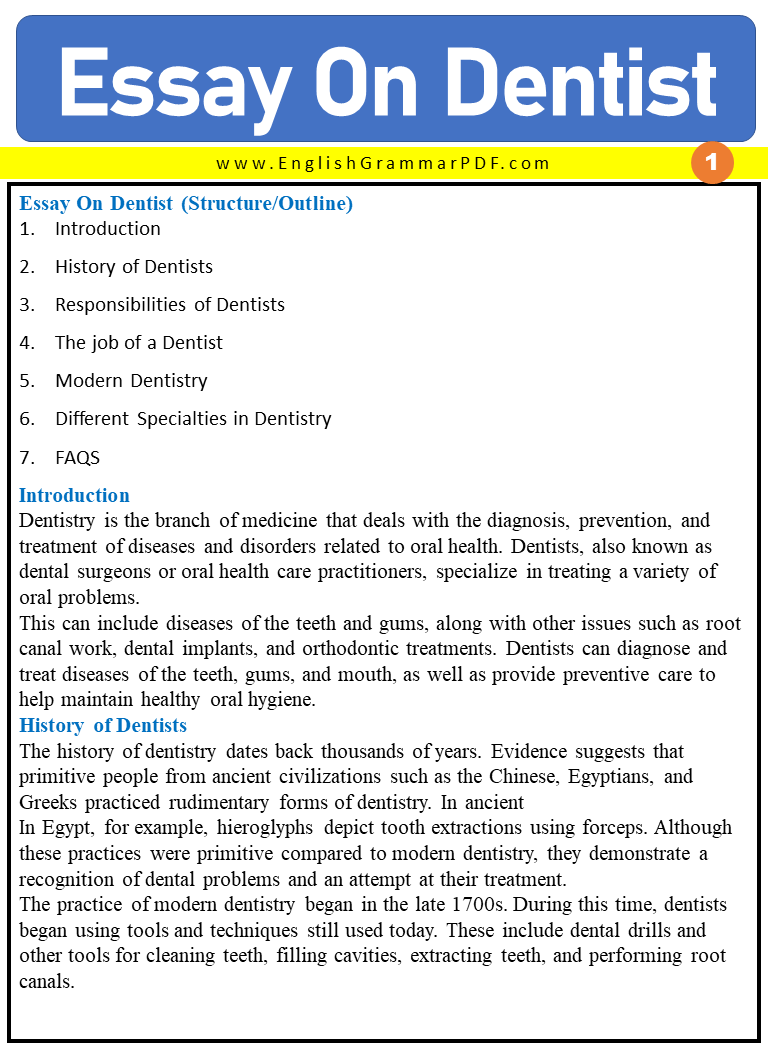
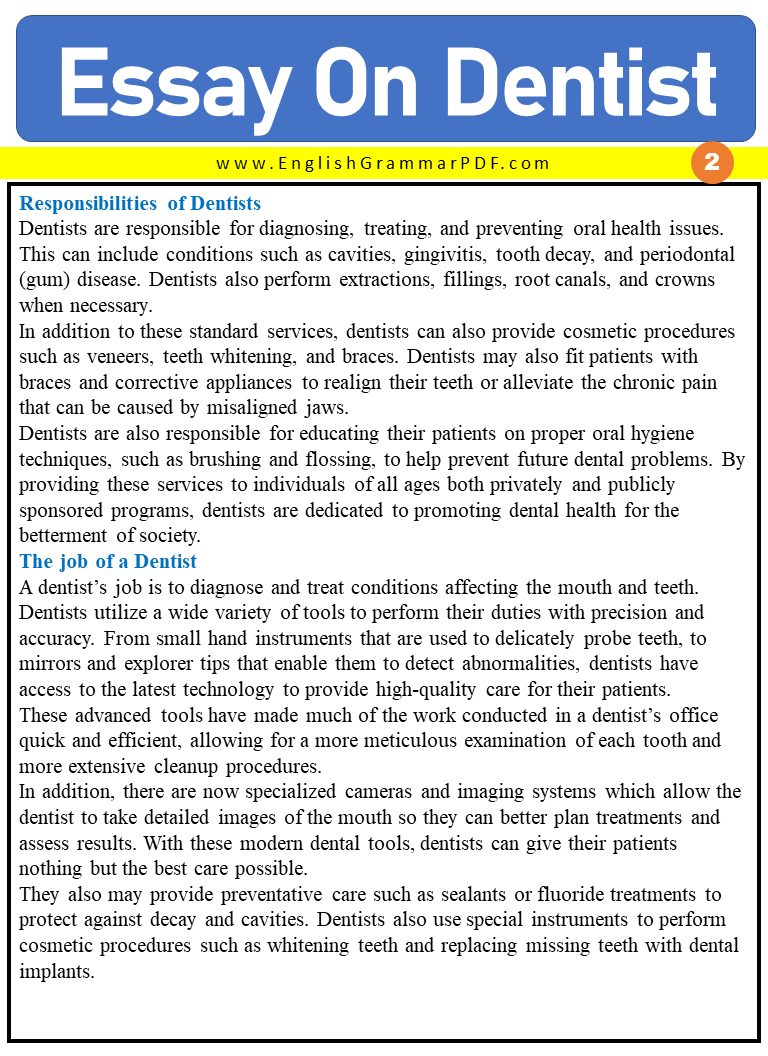
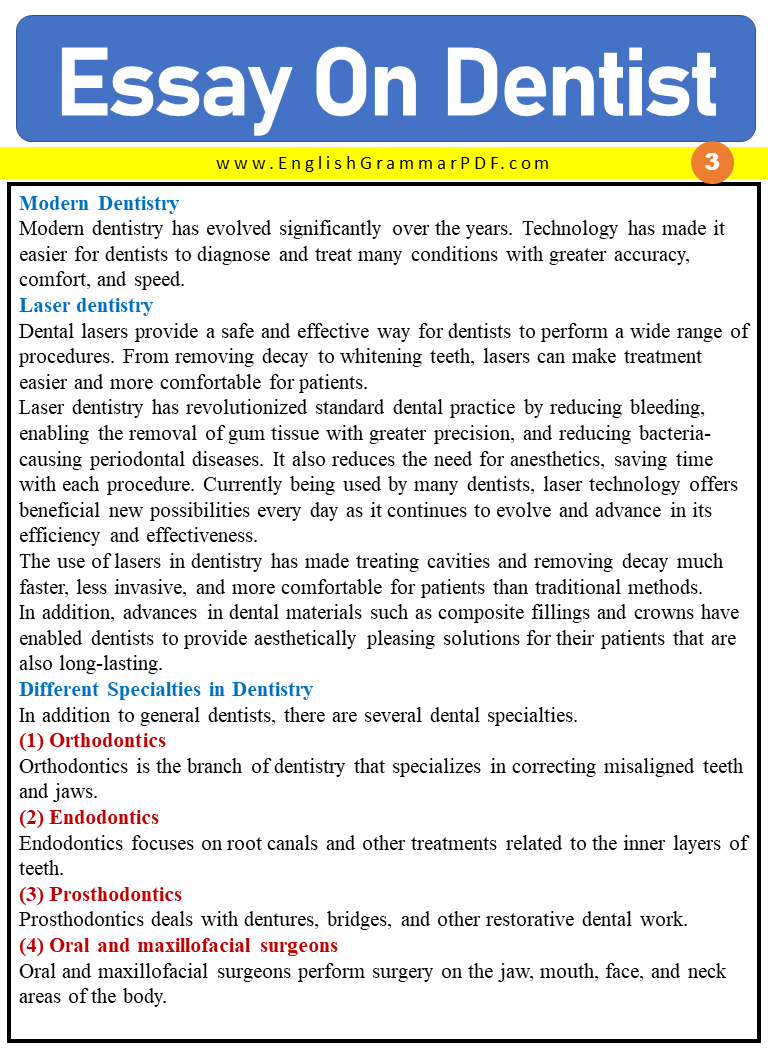
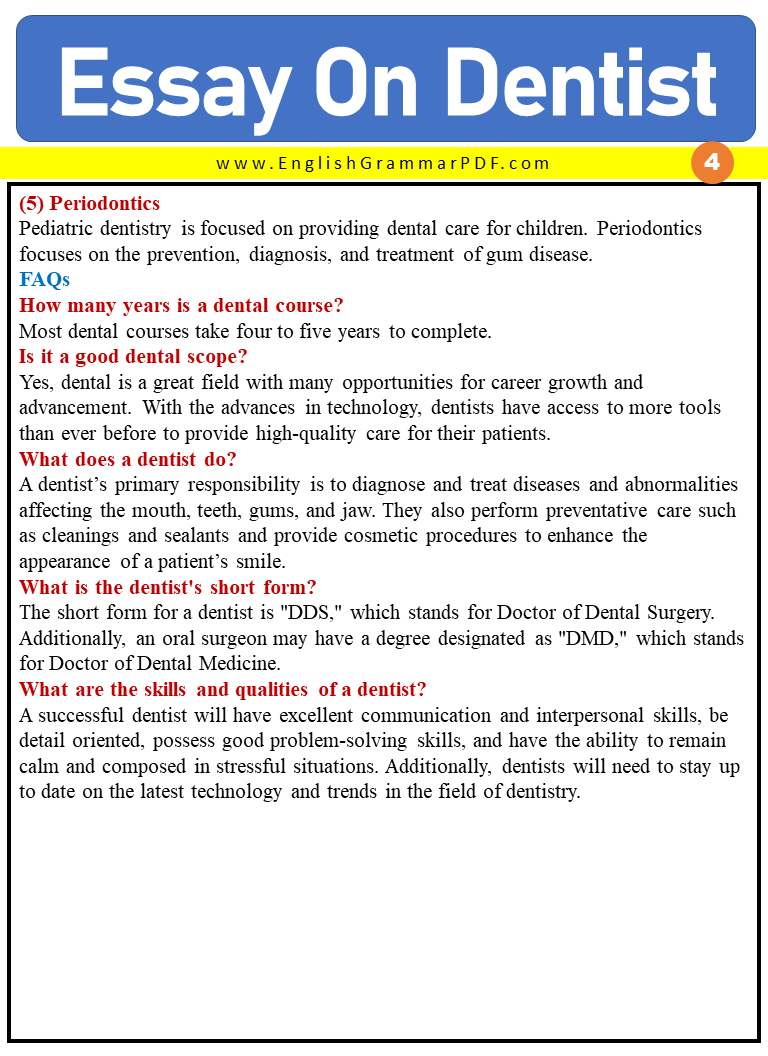
Related: Essay on Cricket
Below is the PDF of this Essay.


